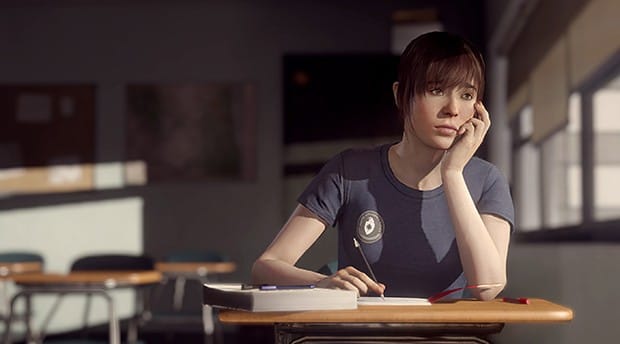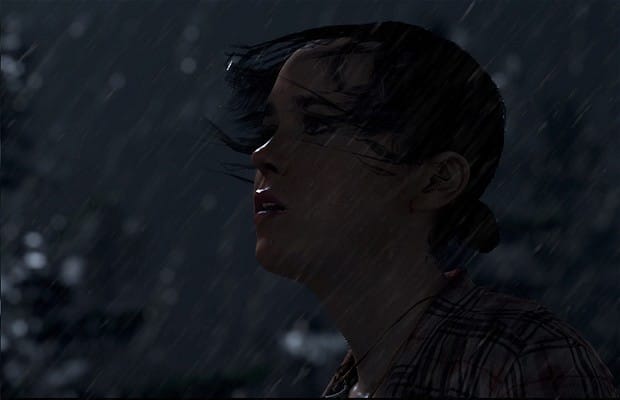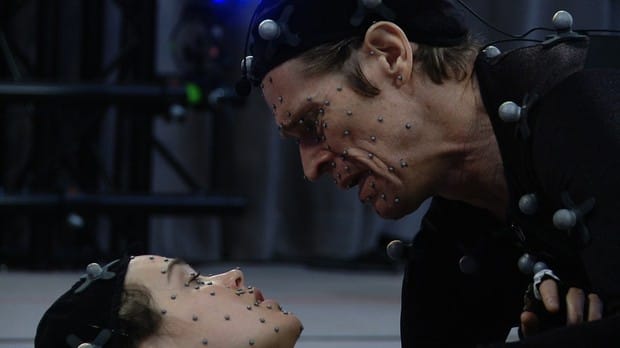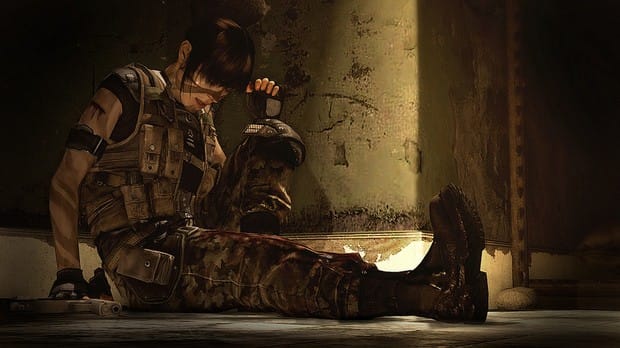Beyond: Two Souls wants to be more than a videogame, but it’s much less

The word “game” cannot be found anywhere on the box for Beyond: Two Souls. The press materials from Quantic Dream tout it as “an interactive cinematic experience,” a “unique psychological action thriller,” a “powerfully emotional journey,” and in a singular use of the dirty word: a “journey unlike any video game.” This aversion to being labeled as purely game is both amusing and revealing.
Beyond: Two Souls is irritated that it has to deign to even be a game when it is impatiently hustling to try to be a movie. The cinematic pedigree of the cast and team—the acting talents of Ellen Page and Willem Dafoe, the musical force of Lorne Balfe and Hans Zimmer, the motion-capture magicking, the astounding visuals—are central to Beyond’s ambition. We, the players are grains of sand in the eye of its outsized vision. And in turn, we grow frustrated; in fact, my primary “emotional journey” as protagonist Jodie Holmes was through the nine circles of Frustration.
I found Beyond to be frustrating and irritating and heartbreaking, largely because of how much potential it squandered.
I found Beyond to be frustrating and irritating and heartbreaking, largely because of how much potential it squandered. It was much like seeing a sculpture made of fiberglass, steel and crystal built on a tottering wooden frame. One gets the sense David Cage and his team were so carried away by their vision that they forgot to check the gears and oil (the plot, the actual writing) needed to keep the dream machine running smoothly.
And on the surface, the machine does run. Beyond is so visually polished, so aesthetically clean, that some may be content to be in the audience watching, hand light on the controls. Beyond is, foremost, an opportunity to puppeteer Ellen Page through a series of stock movie sets. It’s also, perhaps, a grand metaphor for our passive participation in our own lives, going through the motions of engagement, empathy and love.
*
But let’s back up. Jodie Holmes, played by Ellen Page, is a girl born with the Gift of Ghost. Her Ghost Pal, Aiden, is linked to her through a plasmic thread. She suffers a terrible childhood and adolescence and is unable to live a normal life. People hate her for her freakish ability. She is transferred to a lab and lives under the auspices of paranormal researcher Nathan Dawkins, played by Willem Dafoe, and Cole Freeman, his assistant. In her teens, she’s asked to join the CIA, under Ryan Clayton. They fumble at romance.

Fast forward. After I actually finished the game, I gazed at elfin Ellen Page’s sharp, little face on the title screen. I felt like a surgeon and an art appraiser and a voyeur in one, seeing her precisely rendered so close. Her hazel eyes catch light from four different sources. We can count every mole, each pore in her upturned nose, each individual hair in her brows, the smirk lines around her mouth.
We have watched this face that we haven’t earned such closeness to, such intimacy with, emoting exhaustively in thousands of scenes. All its surface beauty given to us in this asymptotic approach to life. Yet though there were many moments I believed I was watching Ellen Page, I felt unmoved and cold after spending so much time with her. This face is a mask and her digital body is a vessel, and for all her life-like being, she is not Ellen Page. I remembered more often—precisely because this is a game that banks on its replication of reality—that she wasn’t real. Digital Ellen Page must submit to the system of story, mechanic, narrative.
Digital Ellen Page must submit to the system of story, mechanic, narrative.
The movie, after all, is a production, the work of multiple teams working, one hopes, in harmony. The actor collapses into her chair and her sound people, her script people, her makeup people, close around her like wings.
The movie I thought most about during Beyond was the baroque Ingmar Bergman epic Fanny and Alexander, another piece of fiction about ghosts and spirits traipsing around the living. In one of the film’s most famous scenes, Alexander, wandering a house in the middle of the night, finds a puppet warehouse, and listens to God—played by a puppet—speak.
Beyond is just such a puppet warehouse and you are the sleazy puppetmaster. Everyone in this world—from Jodie’s adopted family, to the grim Dawkins, to Ryan, to the CIA, to the whole government, wants to puppeteer Jodie towards their ends. The one person who wanted Jodie to live her own life—her birth mother—is conveniently placed in a lifelong coma by the government. No one owns their bodies. Jodie cries out at Ryan, at Nathan: I’m sick of being your puppet! What am I to you? A toy?

Beyond’s player angles Jodie and Aiden to fulfill a number of limited movements, with the impact of choices largely sealed in the chapter you are in: walk here, run there, turn over tables, flick lights on and off. It was hard to not feel insulted by the all caps-lock “MOVE THE STICK DOWN,” barking at me to follow boring steps through preciously orchestrated scenes.
I pull the strings on Jodie’s limbs in the direction she’s already moving, an unseen hand held on mine to commandeer the action. As Aiden, I “inhabit” Jodie, and she uses her psychic energy to move him through buildings, eavesdrop on conversations and read the memories of others. I had to close my eyes during these segments, in which Jodie’s eyes roll back to show their milky whites. The sight is disturbing, for one, and in that moment, I’m also cut off from her.
The sight is disturbing, for one, and in that moment, I’m also cut off from her.
This cut-off was a recurring theme. Just as Jodie drew me into feeling for her, her joints jerked about unnaturally, or she said some stilted line, or she kissed someone awkwardly without lead-in, or she was possessed by a ghost. While I believed in Jodie and Dawkins in some scenes, in others, their movements struck as tinny, hollow. It happened when I walked through a submarine with a portal to the spirit world and all the souls of the dead, and I saw the crewmembers idling in the t.v. room, bored. The break happens when Jodie weeps after Aiden has willfully ruined a dinner-date with Ryan, and we hover above her as Aiden, cold and silent, offering no warmth or connection.
It’s fitting that Ryan is played by Eric Winter, human mannequin, best known as Rex DiMera on Days of Our Lives: a living symbol of romance brought in to dance around stiffly as Jodie’s Love Interest.
This inconsistency flummoxed me. Jodie, Page, is perfect when channeling frustration, anxiety and sadness. And Willem Dafoe is masterful as Dawkins. He made even his absurd lines (“I have defeated Death, Jodie!”) sing. This reality-work shook me; this is what a great actor can do. Whether puppet theater, live theater, digital motion-capture or film, acting is the convincing approximation of the real. Actors depend on recreating symbols of emotion—a meaningful glance, a stream of tears, a small smile to oneself, a well-placed pause—in a way that makes you believe they are deep-thinking, motivated creatures.
Watching the creation videos for Beyond, with Dafoe and Page in motion-capture suits, tumbling around in a weird little room filled with cardboard props, one is struck by the potential for understanding how people’s faces and bodies move and create emotion. We now can track and trace twitches, jaw drops, eye contractions, smirks, head-cocks, brow-furrowing: the whole complex calculus of facial tics that evoke feeling. But atop a perfectly rendered facial expression, we also need good storytelling, sincere conversation, and narrative memory.

It’s been proven that throughout the world people have similar facial expressions for certain strong feelings. This is why I understand a little child soldier in Somalia speaking to Jodie in Arabic, when I know none, because his eyes widen as he leans in to talks to her. The young child Jodie slumps and her face falls hard when her adopted father snips at her. When Cole calls Jodie princess, even as a grown woman, her face softens and her smile is open and warm; she remembers his protection, the safe space he made for her.
I was frustrated by the underlying questions: when the artifice in Beyond worked, why—and when it did not, why? Down the rabbit hole we go: How do you know a person’s emotions are genuine? How does the brain register trust? Sincerity? Interest? If I decide one person is trustworthy based on some obscure alchemy of expressions and gestures, well, our relationships seem quite arbitrary, don’t they? My believing you is as much rooted in how I need to feel in a moment, as it is based in hard, clear-eyed reason, no? Good grief.
Yesterday, I peered too closely at a friend’s face as she spoke. I was trying to line up her words with her expressions with the emotion she was expressing. The wires and rigging in my head started to creak as I tried to piece together the process. She stopped talking, seeing my consternation, and asked me, What the hell are you doing?
*
We learn that just as the pantomime of feelings does not make drama, it also isn’t enough to just hint at interiority, to, hint at deep narrative. Beyond makes aggressive flicks of the wrist at all these vital elements of a realized world.
For one, Beyond jerks you back and forth across Jodie’s life and times without understanding how anachrony needs to serve the story. Jodie remembers her life as “a chaos of images with no order,” and she is thrust into new chapters with no narrative bridgework attempting to explain why this disorder is significant. But my understanding of the story isn’t deepened by the choice of structural fragmentation; I don’t need to see Jodie in thrall to an ancient Native American spirit god right before I’m drawn back to watching her teenage transition to the CIA. This is a weak symbol of fading memory, not a considered, realistic representation of how fading memory is experienced.
My understanding of the story isn’t deepened by the choice of structural fragmentation.
The score is the game’s most perfect stand-in for the High Drama that the writing does not create. When you hear the soundtracks for Zimmer’s Inception or The Dark Knight Rises, or Balfe’s Assassin’s Creed, the mind is swept out and over the world and time and your heart swells and you almost forget yourself. But those scores belonged to stories that deserved them. Beyond’s soundtrack is out of step with what is happening on screen. The symphony swells as Aiden knocks over a table and a lamp at a childrens’ party; it cascades and crashes as Jodie throws a hormonal fit because she didn’t get to be as punk as she wanted to be.
As everywhere, you can see the manipulation, the levers rising and moving: here, add in another lilting epic female voice singing aaaahhooohhahhhhoooh over violin swells, white fade, cut shot, landscape, helicopter coursing in slow motion over a city. Aaahhhooooh.
At other moments, the music is just right, and Jodie is approaching the black hole sun of the undead, struggling through an electric storm, and her love for Ryan somehow feels real as he rocks back and forth on the black hole sun ground, and you have a weird, dissonant but soaring preview of what games could, might, one day, be. Where all this puppeteering and replication and striving could maybe, one day, go.
*
Beyond serves as a lesson. If games need to honor one skill that is criminally undervalued, it is writing. The most astounding, marvelous digital spectacle collapses in on itself without good writing as its chassis.
If games need to honor one skill that is criminally undervalued, it is writing.
There’s still something wonderful about an experience like this, this aspiration to be filmic. Because it is still working out how to be, it makes all the mechanics of a film visible and palatable, where films mask their levers and pulleys and stitch-work a bit more seamlessly. If this game had the intense, memorable writing it aspires toward, it could be a work that honors the time, effort and incredible talent of the actors in it.
I found this act of gesturing pretty moving, particularly as we are swept into the last three hours with little space to breathe . I found myself feeling so much by the end, for myself, for the people in my life, that perhaps Beyond did more of a number on me than I’d care to admit.
The game’s central themes, about the past and memory and letting go, start to cohere here. Jodie’s main connection to other people is through memory. Aiden is her medium to others—to see their memories and relive the past. She can connect Dawkins-Dafoe to his dead wife and child; she can hold the hands of a homeless man who lost his wife, to hear her tell him that he needs to let go.

“Soon, you can go back to being a kid again,” Jodie tells the child soldier as she runs with him through a street filled with flaming cars. You can never go back to being a kid again, of course, and things don’t necessarily get better. But perhaps, that’s for the best. Dawkins begs Jodie to help her speak to his wife and daughter through Aiden. They then beg him to let them go, to stop trying to trap their spirits in this world with a Condenser, an elaborate metaphor for trying to freeze time and defeat death.
Stranded on an ice floe, near-death, Ryan tells Jodie that he loves her. That she should know this, in case they die out there. He asks her, Do you love me, too?
Our options: YES, floating by an X and NO, floating by the circle mark. Yes, I love you, Ryan. Why the hell not? Sure, I love you. The choices of yes, I love you, and no, I don’t, are equally arbitrary. We often say what we need to in the moment to feel something. I see love in his face. I want to feel love, too.
The game’s ending offers a layered truth: You can love someone with everything in you and they can leave you, stop loving you, or disappear, or die. You have to live regardless. The pain of that knowledge and that experience forms the transition of child to adolescent, teen to adult. The ability to feel fully, then let go of what once gave us meaning, defines us. The choice to continue moving defines us. To choose life. Choose feeling anew. Choose burial. Choose grace.



